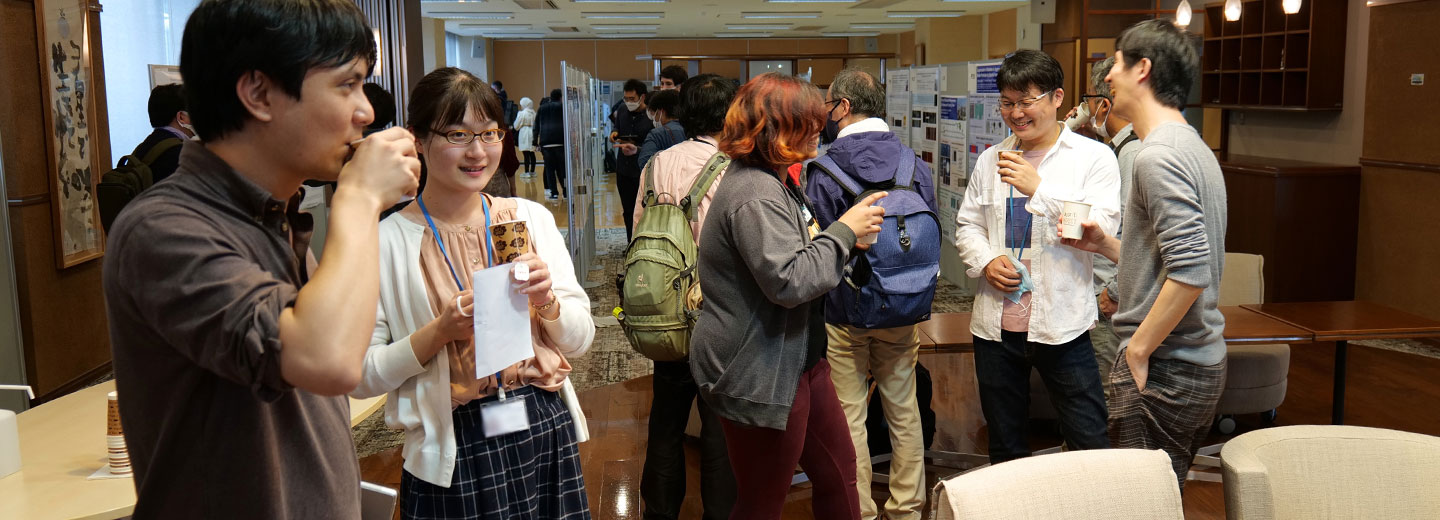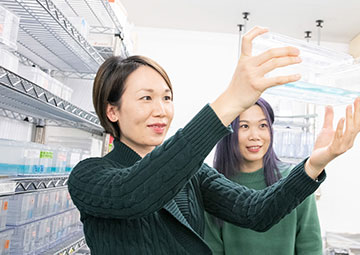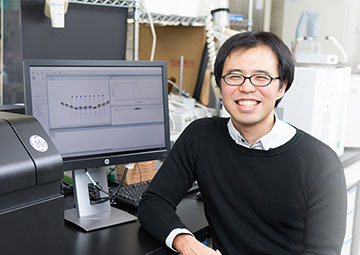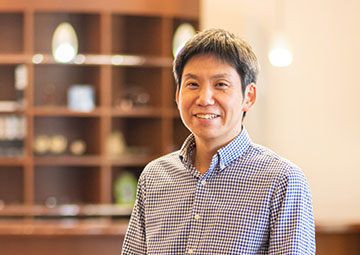
JobsPrincipal Investigator
Working as a Principal Investigator at BDR
RIKEN BDR has a flat organizational structure in terms of research, where all of its principal investigators (PIs) stand on equal footing working to fulfill BDR’s missions. There are about 30 PIs, appointed as Team Directors and Unit Leaders, with approximately half of them currently in their 30s and 40s. For many of them, joining the BDR as a PI was the start of their independent research careers.
BDR values curiosity-driven research, which allows early-career PIs to pursue their research based on their own unique ideas.
One of BDR’s strong attributes is its PIs who have backgrounds in various disciplines. Their expertise ranges from biology, chemistry, physics, engineering, mathematics, computer science, and medicine—exceptional diversity for a life science research institute.
Exploiting this rich diversity in research, we have established several cross-disciplinary collaborative projects (called Center Projects), which promotes cooperation among multiple laboratories to work on specific themes or target areas. Each Center Project organizes research meetings throughout the year in which most are open to any BDR researchers that are interested.
There are a wide range of seminars and symposia organized by the Center, which are open to all BDR members and often to the scientific community as well. Internally, there is an annual research retreat, monthly scientific exchanges and more, which provide ample opportunities for PIs and other researchers who have different backgrounds and different interests to network and interact with each other. These opportunities also lead to new and exciting collaborative and interdisciplinary research.
The BDR has a wide range of state-of-the-art research instruments designated for shared-use that all BDR researchers have full access to. There are also researchers at BDR that are working in the research and development of more sophisticated technologies and techniques, such as high-performance microscopes, customizations for various analytical instruments, and hardware and software for supercomputers. It is often the case that new PIs at BDR will collaborate with the other BDR laboratories with expertise in developing specific instruments to create novel technologies to meet their own research objectives.
Team directors are provided with a generous start-up package to help set up their laboratory, that includes sufficient funds for hiring one or two post-docs and technical staff. When hiring non-Japanese speaking staff from abroad, the local human resources section provides English-language support to help navigate the administrative procedures as well as other matters outside the lab life such as banking and housing, which is essential for settling into life in a new location, but can be overwhelming and difficult for those coming from overseas.
PIs at BDR can enjoy a research environment where they are able to concentrate on their own research, but they also have opportunities to recruit graduate students and take a proactive role in fostering the next generation of young researchers. The BDR has a system in place that allows laboratories to host and supervise graduate students not only from Japanese universities, but from around the world as well.
New PIs at BDR have appointed mentors who they can consult with regarding any concerns about lab management. Many of the mentors are also relatively younger PIs in their 30s and 40s, who are at career stages slightly ahead of the new PIs.
Early career PIs are also actively involved in the overall management of the institute. For example, they play an active role in a number of the working groups, such as for scientific meetings, education, and diversity, and are a source of many new ideas for revitalizing and reinventing activities at our Center.
At BDR, we seek individuals who are not afraid to break free from the mold, and boldly take on new challenges.
Open Call for Principal Investigators
Seeking a Team Director (Principal Investigator, Indefinite-term) (K24088)
Application deadline: Noon, May 2, 2025 (Japan Standard Time)
Voices of Principal Investigators

Li-Kun Phng
Starting a new laboratory while being a mother for the first time in a country whose language I do not speak was incredibly challenging. I received immense support from senior PIs as well as the administrative staff in establishing my lab and in learning how everything (from ordering reagents to grant applications) operates in Japan. Any language barrier was overcome by my dedicated lab assistant who acted at the interface between my lab and the rest of Japan. As for childcare, I was able to send my daughter to Po-I Kids, a daycare center a few minutes’ walk away from RIKEN Kobe. As it is open for the whole day, I was able to spend the entire day focused on work while knowing that my daughter was well looked after. With these support systems, combined with the generous start-up fund and the annual core funding provided to early career Team Directors, I was able to kickstart my independent research career while balancing raising a family.

Shunsuke Tagami*
I work in the fields of structural and synthetic biology, and there are a number of researchers working in these fields at BDR, so I have no trouble finding people to engage in discussions and to ask for help in my day-to-day research activities. There are also researchers here at the Center working in quite different fields, and if there is something I am interested in, I can always talk to people working in those areas and expand the breadth of my research through collaborative research.
We have access to all kinds of shared-use equipment such as those for X-ray diffraction, cryo-EM, and NMR spectroscopy. There are also full-time staff providing technical support for these specialized instruments. This is wonderful as it means that even if I am not familiar with a certain technique, if needed, I can still incorporate the use of these instruments into my research and embark on a challenge to uncovering new phenomena.
As someone that was new to laboratory management, I was very grateful for the generous support I received from the administrative staff at RIKEN headquarters as well as the Center. We receive the latest information about applications for external funding, so I don’t have to spend time searching for funding opportunities and hence has reduced my workload considerably. RIKEN also has various support programs available that we can use to host graduate students in the lab, such as the Junior Research Associate (JRA) program, and offers conditions that are favorable for both graduate students and the laboratory.
*Team Leader at BDR from Apr. 2018 to Mar. 2025. He moved to RIKEN Center for Integrated Medical Sciences as of Apr. 2025.

Tomoya Kitajima
I believe that the most important quality of a PI is to enjoy research. The most satisfying aspect of research for me is identifying important questions or setting research goals based on our interests, and then working together with colleagues through repeated processes of trial and error to achieve those goals. BDR is the place to that allows me to do that. The emphasis is not on past achievements or current trends in research, rather, it is placed on the important questions that need to be clarified no matter how much time and effort it takes, as well as the future plans that will drive research toward the goals that have been set.
Since I joined RIKEN to launch my lab, I have received a lot of support in terms of setting up the laboratory, operating expenses, shared-use equipment, finding collaborative research opportunities, and mentoring. I believe that the driving force of BDR comes from having the right environment for young ideas to flourish!



